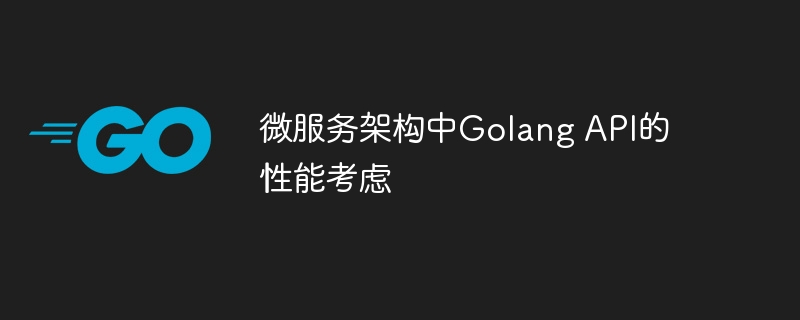微服務架構中Golang API的效能考慮
- WBOYWBOYWBOYWBOYWBOYWBOYWBOYWBOYWBOYWBOYWBOYWBOYWB原創
- 2024-05-07 18:36:011163瀏覽
為了優化 Go API 的效能,建議:1. 使用靜態檔案快取機制;2. 採用分散式追蹤機制來追蹤請求的處理過程,以便發現並解決效能瓶頸。這些技術可以有效減少延遲、提高吞吐量,進而提升微服務架構的整體效能和穩定性。

微服務架構中Go API 的效能最佳化
引言
在微服務架構中,性能是至關重要的。本文將重點討論如何透過各種技術優化 Go API 的效能,從而減少延遲並提高吞吐量。
程式碼範例
靜態檔案快取
// ./handlers/cache.go
package handlers
import (
"net/http"
"time"
"github.com/go-cache/go-cache"
)
// Cache is an in-memory cache.
var Cache = cache.New(5*time.Minute, 10*time.Minute)
// CacheRequestHandler is a middleware that caches HTTP responses.
func CacheRequestHandler(next http.Handler) http.Handler {
return http.HandlerFunc(func(w http.ResponseWriter, r *http.Request) {
// Check if the response is already cached.
if cachedResponse, found := Cache.Get(r.URL.Path); found {
// If found, serve the cached response.
w.Write(cachedResponse.([]byte))
return
}
// If not found, call the next handler.
next.ServeHTTP(w, r)
// Cache the response for future requests.
Cache.Set(r.URL.Path, w, cache.DefaultExpiration)
})
}// ./main.go
package main
import (
"fmt"
"net/http"
"github.com/gorilla/mux"
"./handlers"
)
func main() {
r := mux.NewRouter()
// Add middleware to cache static file responses.
r.Use(handlers.CacheRequestHandler)
}分散式追蹤
// ./handlers/trace.go
package handlers
import (
"context"
"fmt"
"net/http"
"github.com/opentracing/opentracing-go"
"github.com/opentracing/opentracing-go/ext"
)
func TracesHandler(w http.ResponseWriter, r *http.Request) {
// Create a new span for this request.
span, ctx := opentracing.StartSpanFromContext(r.Context(), "traces")
// Add some tags to the span.
ext.HTTPMethod.Set(span, r.Method)
ext.HTTPUrl.Set(span, r.RequestURI)
// Simulate work being done.
fmt.Fprintln(w, "Hello, traces!")
// Finish the span.
span.Finish()
}// ./main.go
package main
import (
"fmt"
"net/http"
"github.com/gorilla/mux"
"github.com/opentracing/opentracing-go"
"github.com/uber/jaeger-client-go"
"github.com/uber/jaeger-client-go/config"
)
func main() {
// Configure and initialize Jaeger tracer.
cfg := &config.Configuration{
ServiceName: "go-api",
}
tracer, closer, err := cfg.NewTracer()
if err != nil {
panic(err)
}
defer closer.Close()
opentracing.SetGlobalTracer(tracer)
r := mux.NewRouter()
// Add route that uses tracing.
r.HandleFunc("/traces", handlers.TracesHandler)
}#結論
透過實作這些效能最佳化技術,Go API 可以在微服務架構中有效地運行,從而提高使用者滿意度和整體系統效能。
以上是微服務架構中Golang API的效能考慮的詳細內容。更多資訊請關注PHP中文網其他相關文章!
陳述:
本文內容由網友自願投稿,版權歸原作者所有。本站不承擔相應的法律責任。如發現涉嫌抄襲或侵權的內容,請聯絡admin@php.cn

